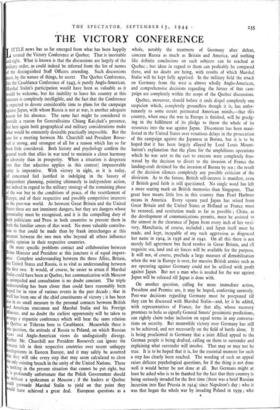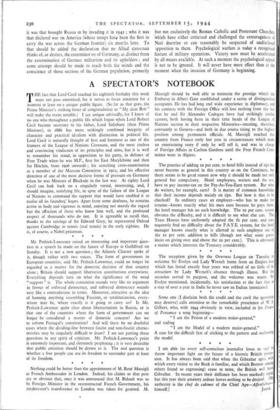THE VICTORY CONFERENCE
ITTLE news has so far emerged from what has been happily termed the Victory Conference at Quebec. That is inevitable ad right. What is known is that the discussions are largely of the 'limy order, as could indeed be inferred from the list of names if the distinguished Staff Officers attending. Such discussions ust, by the nature of things, be secret. The Quebec Conference, 'Ix the Casablanca Conference of 1943, is purely Anglo-American. larshal Stalin's participation would have been as valuable as it • ould be welcome, but his inability to leave his country at this tincture is completely intelligible, and the fact that the Conference s expected to devote considerable time to plans for the campaign gainst japan, with whom Russia is not at war, is another adequate eason for his absence. The same fact might be considered to ovide a reason for Generalissimo Chiang Kailhek's presence, ut here again both geographical and military considerations make • hat would be eminently desirable practically impossible. But the ase for a meeting between Mr. Churchill and President Roose- elt is strong, and strongest of all for a reason which has so far een little considered. Both history and psychology confirm the :eneral truth that allies in war tend to maintain a closer harmony adversity than in prosperity. When a situation is desperate not that that adjective applies in this context) impenetrable nity is imperative. With victory in sight, as it is today, ll concerned feel justified in indulging in the luxury of ndependent planning, pointing ultimately to independent action, at indeed in regard to the military strategy of the remaining phase f the war but to the conditions of peace, of the resettlement of urope, and of their respective and possibly competitive interests the post-war world. As between Great Britain and the United tates these are not imminent dangers, but they are dangers whose tentiality must be recognised, and it is the compelling duty of oth politicians and Press in both countries to prevent them in oth the familiar senses of that word. No more valuable contribu- ion to that could be made than by frank interchanges at this oment between the two men who beyond all others influence ublic opinion in their respective countries.
On more specific problems contact and collaboration, between rime Minister and President at this juncture is of equal import- ace. Complete understanding between the three Allies, Britain, e United States and Russia, is as vital as understanding between he first two. It would, of course, be easier to attain if Marshal talin could have been at Quebec, but communication with Moscow s unimpeded and consultation is no doubt constant. The triple nderstanding has been closer than could have reasonably been aped for in view of various events in the past decade ; that in tself has been one of the chief constituents of victory ; it has been tie in no small measure to the personal contacts between British nd American statesmen and Marshal Stalin and his Foreign mister, and no doubt the earliest opportunity will be taken to rrange a tripartite conference which will bear the same relation Quebec as Teheran bore to Casablanca. Meanwhile there is e question, the attitude of Russia to Poland, on which Russian • tews and Anglo-American views do undisguisedly diverge. either Mr. Churchill nor President Roosevelt can ignore the oncern felt in their respective countries over recent unhappy evelppments in Eastern Europe, and it may safely be assumed at they will take every step that may seem calculated to close he only existing breach in the unity of the United Nations. There !lathing in the present situation that cannot be put right, but Is profoundly unfortunate that the Polish Govemnient should Without a spokesman at Moscow ; if the leaders at Quebec °Ilid persuade Marshal Stalin to yield on that point they °aid have achieved a great deal. European questions as a whole, notably the treatment of Germany after defeat, concern RUssia as much as Britain and America, and nothing like definite conclusions on such subjects can be reached at Quebec ; but ideas in regard to them can profitably be compared there, and no doubt are being, with results of which Marshal Stalin will be kept fully apprised. In the military field the attack on Germany from the west is almost wholly Anglo-American, and comprehensive decisions regarding the future of that cam- paign are completely within the scope of the Quebec discussions.
Quebec, moreover, should before it ends dispel completely one suspicion which, completely groundless though it 'is, has unfor- tunately to some extent permeated American minds,—that tgis country, when once the war in Europe is finished, will be grudg- ing in the fulfilment of its pledge to throw the whole of its resources into the war against Japan. Discontent has been mani- fested in the United States over vexatious delays in the prosecution of the campaign against the Japanese in Burma, but it is to be hoped that it has been largely allayed by Lord Louis Mount- batten's explanation that the plans for the amphibious operations which he was sent to the east to execute were completely frus- trated by the decision to divert to the invasion of France the landing-craft destined for the invasion of Burma by sea ; the result of the decision silences completely any possible criticism of the diversion. As to the future, British self-interest is manifest, even if British good faith is still questioned. No single word has left a more searing mark on British memories than Singapore. That great base means little less in this country than Pearl Harbour means in America. Every square yard Japan has seized from Great Britain and the United States or Holland or France must be restored, and restitution made as far as possible ; China, as the development of communications permits, must be assisted to the utmost in the clearance of Japan from every inch of her terri: tory, Manchuria, of course, included ; and Japan itself must be made, and kept, incapable of any such aggression as disgraced her name in 1904, in 1936 and in 1941. On all this there is not merely full agreement but fixed resolve in Great Britain, and all requisite sea, land and air forces will be available for the purpose. It will not, of course, preclude a large measure of demobilisation when the war in Europe is over, for massive British armies such as are operating against Germany could not be utilised with profit against Japan. But not a man who is needed for the war against. Japan will be released till Japan is done with.
On another question, calling for more immediate action, President and Premier are, it may be hoped, conferring earnestly. Post-war decisions regarding Germany must be postponed till they can be discussed with Marshal Stalin—and, let it be added, with representatives of France, for that ally, whose recovery promises to belie so signally General Smuts' pessimistic predictions, can rightly claim today inclusion on equal terms in any conversa- tions on security. But meanwhile victory over Germany has still to be achieved, and not necessarily on the field of battle alone. It is being proclaimed in Germany that a joint Allied appeal to the German people is being drafted, calling on them to surrender and explaining what surrender will involve. That may or may not be true. It is to be hoped that it is, for the essential moment for such a step has clearly been reached. The wording of such an appeal raises delicate psychological questions, for if the thing is not done well it would better be not done at all. But Germans might at least be asked who is to be thanked for the fact that their country is being seriously invaded for the first time (there was a brief Russian Incursion into East PrUssia in 1914) since Napoleon's day ; who it was that began the whole war by invading Poland in 1939 ; who it was that brought Russia an by invading it in 1941 ; who it was that declared war on America (whose troops have been the first to carry the war across the German frontier) six months later. To that should be added the declaration that no Allied statesman thinks of, or desires, the extermination of Germany, as distinct from the extermination of German militarism and its upholders ; and some attempt should be made to reach both the minds and the conscience of those sections of the German population, primarily but not exclusively the Roman Catholic and Protestant Churches, 'Which have either criticised and challenged the extravagances of Nazi doctrine or can reasonably be suspected of undisclosed apposition to them. Psychological warfare is today a recognised feature of military operations. Victory now must be accelerated by all means available. At such a moment the psychological appeal is not to be ignored. It will never have more effect than at the moment when-the invasion of Germany is beginning.























 Previous page
Previous page